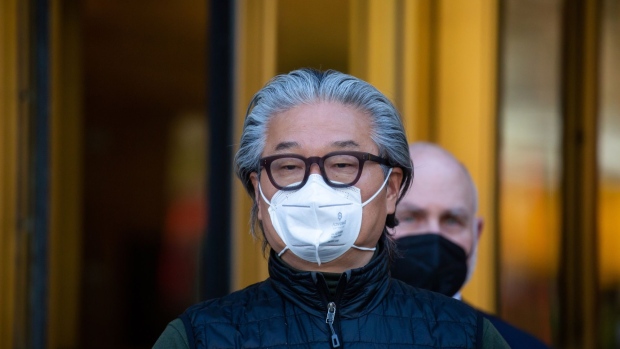Jul 5, 2022
‘God, Hwang and Archegos’: Insider Details of Collapsed Firm Revealed in Lawsuit
, Bloomberg News

(Bloomberg) -- At Bill Hwang’s Archegos Capital Management, staffers publicly professed their allegiance to “God, Hwang and Archegos” and the founder often described himself as “the money guy who teaches the Bible to pastors.”
The “personality cult” of the collapsed family office is at the heart of a lawsuit filed Tuesday by former Archegos managing director Brendan Sullivan, who is seeking to recover $50 million he says is owed from deferred bonuses he was forced to invest with the company. Hwang, he says, did whatever it took to make money, with the goal of becoming the “richest person in the world.”
The civil complaint, filed in New York, is the first look inside the company that entered a death spiral as the Covid-19 pandemic shook markets in March 2021, with Hwang losing more than $20 billion in a matter of days. Sullivan recounts that loyalty to Hwang, not performance, was paramount at the company. Those who toed the line were “good followers” and those who questioned were publicly demeaned, according to the lawsuit.
The lawsuit comes more than two months after federal prosecutors in Manhattan charged Hwang and Archegos Chief Financial Officer Patrick Halligan with multiple counts of fraud and conspiracy for allegedly deceiving Wall Street banks. Prosecutors also charged Hwang with market manipulation. Both men have pleaded not guilty and plan to fight the charges.
While the federal charges focus on fraud perpetrated on the market and Archegos’s banks, Sullivan’s suit alleges that Hwang, Halligan and others committed fraud by forcing employees to invest a big chunk of their annual bonuses into the Archegos deferred compensation plan. Archegos executives told employees that the principal invested in the fund would be protected, that there was “no downside risk,” and that the plan would never drop below the value attained during the previous calendar year.
Read More: One of World’s Greatest Hidden Fortunes Is Wiped Out in Days
On March 26th, as Archegos imploded, Hwang and his team held a firm-wide call, in which they made it clear that employees should not ask to collect their deferred comp, according to the lawsuit. Sullivan contends that the deferred compensation fund had about $500 million in employee contributions at the end of February, but by that call it was zero. It “no longer exists,” Archegos executive Andy Mills said on the call, adding, “don’t play games and try to quit.”
Instead, Hwang and Mills promised they would “take care” of the employees and that there were pools of money available from Hwang’s personal funds and money held by his charity, the Grace and Mercy Foundation, according to the suit.
Sullivan’s lawsuit describes Hwang’s foundation as being bound tightly with Archegos itself, through shared back-office functions and shared investment strategies and intermingled finances. The suit claims that Hwang and his management team viewed the foundation as an “escape pod” for Archegos in case things ever went south for his primary investment business.
“Hwang repeated these statements at the firm’s retreats -- which were shared with the Foundation -- in 2018 and 2019, when he again told employees that the Foundation was his ‘fallback plan’ and if anything ever happened to Archegos, he would be fine and would continue investing through the Foundation,” the suit asserts.
In December 2018, when Archegos’ portfolio had dropped by 35% in value, Hwang told employees that “he was not worried about the portfolio decline, because if Archegos ever ran out of funds, he would always have the Foundation and would just continue to operate there, and that select ‘loyal’ employees and ‘good followers’ would always be able to join him,” according to the suit.
Read More: God and Man Collide in Bill Hwang’s Dueling Lives on Wall Street
During annual performance reviews, Hwang would “evangelize his religious beliefs” and request that employees attend scripture readings funded by his charitable Christian foundation, Sullivan contends. According to the suit, Hwang would often say, “I am the money guy who teaches the Bible to pastors.”
Hwang and his deputies would also lash out at employees who raised questions about the investment strategy. The suit cites an incident from a firm wide meeting in December 2020, where a staffer asked Hwang why he was buying the same concentration of risky stocks every day. Hwang lashed out at the employee, telling him that he was “misinformed” and should “pay attention” and that he was not buying these stocks every day.
At other times, when an employee emailed Hwang to raise questions about a particular investment strategy, Hwang “would often copy the firm in a reply that disparaged and demeaned the employee and the employee’s thoughts,” according to the suit.
The lawsuit’s claims are focused on the Archegos deferred compensation plan, which was described by management as “voluntary.” Sullivan said management “induced and coerced” investments from key employees by promising that their baseline contributions were guaranteed. He also said the firm required employees to decide whether or not to contribute the maximum amount to the plan before Hwang awarded bonuses, “making it clear that whether they elected to contribute and in what amount would be a major factor” in the bonus decision.
“The message was clear. No contribution. No bonus. Protests about this practice were ignored and the protesters punished,” according to the suit.
The case is Sullivan v Hwang et al, 22-cv-5675, US District Court for the Southern District of New York (Manhattan).
©2022 Bloomberg L.P.


